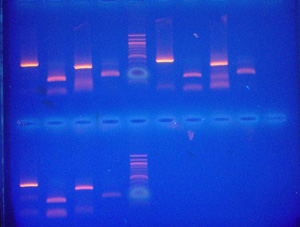Services / Dental DNA Tests
Sophisticated Laboratory DNA Analysis
Dr. Zraiqat is partnering with Dental DNA to run tests detecting and evaluating the microbial DNA that resides in root canal teeth, cavitations, implants, and other oral environments
About Dental DNA
Dental DNA is a sophisticated laboratory specializing in the detection of microbial DNA that resides in root canal teeth, cavitations, implants, and other oral environments. The DNA analysis is intended to identify bacterial, viral, and fungal microbes found in root canals, cavitations, and dental implants.
Correcting and Eliminating Problems
Dental DNA's mission is to help assist joint efforts of the dental and medical profession in determining the identity of etiological factors, as well as to better determine how to correct and eliminate the problem, rather than try to cover up the symptoms with drugs.
Note: Dental DNA's CLIA license is for high complexity for bacteriology, mycology, virology, routine chemistry and toxicology testing. They are a Biosafety level 2 laboratory. Dental DNA provides the CDC recommendation for the treatment of all microbes on your test results. As Dental DNA is not a diagnostic lab, you will review your test results with Dr. Zraiqat to discuss your personal health and plan of action to wellness.
Research
Dental DNA aims to explore genes, such as ApoE and gluten intolerance, as well as develop and provide ongoing research. The newest test available, the Viral Panel, detects 25 different viruses from a variety of clinical specimens. Also, Dental DNA is investigating a hereditary cancer gene panel, including BRCA 1 and 2, prostate cancer, Lynch syndrome, and mismatch repair (MMR) genes.
Testing Scope and Accuracy
The DNA tests can can:
• detect the microbial DNA of aerobic and anaerobic bacteria, fungi and viruses in removed teeth, blood, tissue, implants, bone grafts and other samples sent,
• check for Lyme disease,
• check cells to determine your ability to detoxify mercury, Alzheimer's susceptibility, and other autoimmune/neurological diseases,
• determine susceptibility to gluten intolerance/sensitivity even before symptoms occur,
• and identify viruses from samples with infections (ideal for patients who have tried a course of antifungals or antibiotics and seen no improvement).
Dental DNA uses Polymerase Chain Reaction (PCR) technology, one of the most advanced tools in molecular biology today.

Next Steps
Call to schedule a consultation:
Schedule an appointment today!
© 2023 Holistic Dental Arts Center, All Rights Reserved. | Dental Digital Marketing by Search Engine Projects | Privacy Policy | Do Not Sell My Information.
